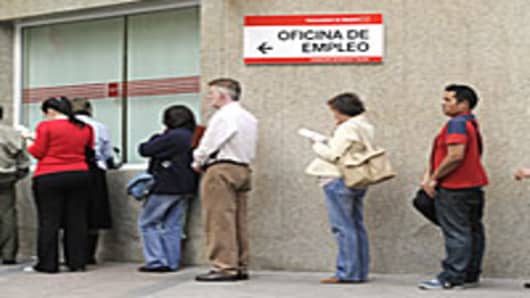Euro zone unemployment rose to 10.8 percent in February, its highest level in almost 15 years as some countries were plunged into recessions by efforts to cut bulging budget deficits and high debt.
"The euro zone unemployment figures for February make for grim reading and cast a dark cloud over growth prospects for the region," Martin van Vliet, an analyst with ING, wrote in a note to clients.
"The elevated unemployment rates in southern Europe are partly caused by structural factors, but also reflect the short-term economic pain inflicted by the draconian austerity programs," he added.
Youth unemployment was 21.6 percent in the euro zone in February, according to the European Union's statistics office, Eurostat. The highest rates of unemployed under 25s - 50.5 percent and 50.4 percent - were in Spain and Greece, while the lowest were in Germany, at 8.2 percent, and Austria, at 8.3 percent.
Larry Hatheway, Managing Director and Head of Global Asset Allocation, UBS Investment Bank, noted earlier this month that high levels of youth unemployment were "clearly undesirable" and policy priorities in the euro zone should shift the focus from managing the debt crisis to address joblessness.
"Youth unemployment rates probably understate the true level of joblessness among the young, as discouraged workers leave the labor force or accept jobs with shorter-than-desired working hours," Hatheway wrote.
He said that high levels of joblessness among the young were not unusual in Europe, with the jobless rate of the young in Europe or the U.S. consistently twice the overall unemployment rate.
"Nevertheless, youth unemployment rates have risen sharply following the financial crisis and 'great recession'. In the euro zone, for example, youth unemployment has risen over six percentage points since 2008," Hatheway wrote.
'Scarring' Effect
The challenges the young face in finding work – including the fact that they have fewer skills and lower levels of productivity which make them less attractive to potential employers – are exacerbated by the large pool of skilled and experience labor caused by the recession, according to Hatheway.
But, he added, the vast differences in the numbers across Europe suggest that other factors contribute to the phenomenon of youth unemployment, such as less flexible labor markets in some countries or skills erosion as studies have shown that the probability of being unemployed rises with past episodes of joblessness.
In a paper published in 2005, economists Paul Gregg and Emma Tominey argued that early unemployment caused a "scarring" effect, generating loss of income throughout a person's life compared with peers who did not experience prolonged joblessness at an early age.
Hatheway said that various studies have shown clear links between youth unemployment and antisocial behavior, alcoholism, mental and physical illnesses and suicide and many commentators have said that the protests in Europe, which have increased over the past year, have youth unemployment as a root cause.
"Europe’s youth unemployment challenge will be successfully met mostly by generating faster growth. Skills enhancement and worker training can help, but the benefits from such policies are likely to be relatively modest," Hatheway wrote.
But, with manufacturing data weak and the euro zone oscillating between recovery and disaster, the prospects for growth are not bright, and therefore unemployment might still rise.
Francois Cabau, an analyst at Barclays Capital, thinks euro zone unemployment is not likely to accelerate its growth in the next few quarters like it did in the depths of the recession in 2008 and 2009; but because it is high already, the jobless rate is likely to break February's record.
"It nevertheless remains that the starting point level is much higher and as a result, we expect that the historical first quarter '97 record unemployment rate of 10.9 percent will be topped as soon as the second quarter of 2012," Cabau wrote in a note to clients.
"Our baseline scenario goes for another 0.3 percentage points increase in the second quarter of 2012 to 11.1 percent," he added.


